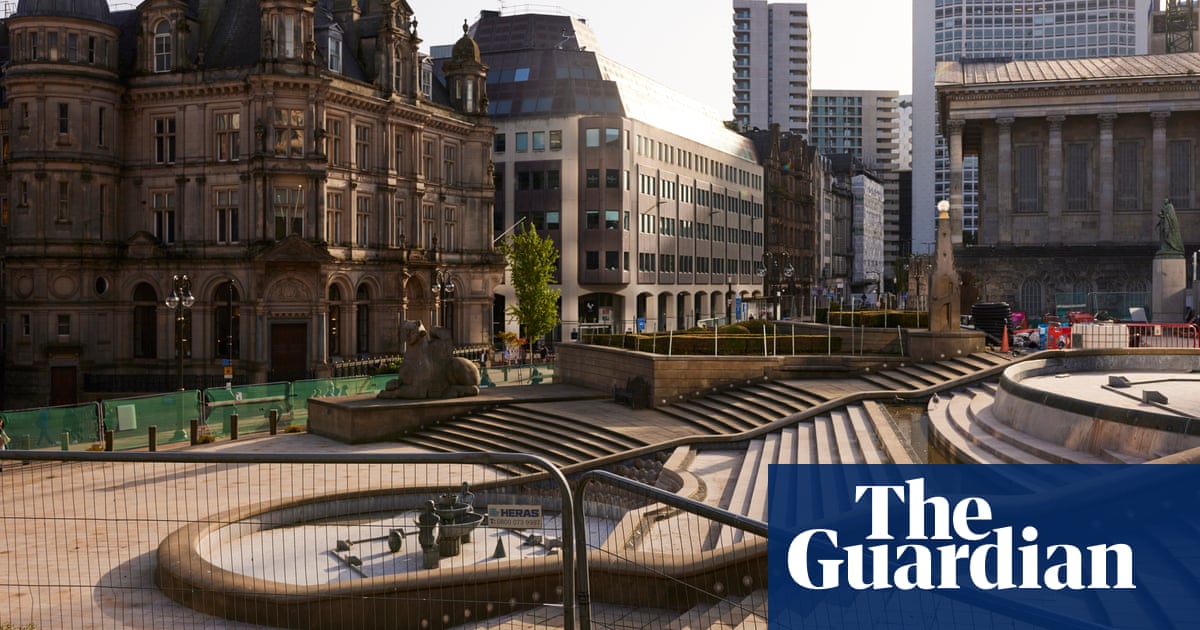
It’s a drizzly afternoon in October, and under the curved-glass ceiling of an old, quietly imposing Edwardian library building in Homerton, a group of teenagers and twentysomethings are careering around a small rehearsal room, jostling and banging and shouting and squawking to a bruising combination of kicks and snares. It’s not immediately clear what’s going on until director Dominic Garfield sidles over to offer on oblique explanation. “This one’s a bit techy,” he says, eyes focused on the unfolding chaos.
The group are rehearsing for The UK Drill Project, a new theatre show that blends acting, video projections and original music to unpick the tricky relationship between music, criminality and the complex causes of youth violence. It’s a couple of weeks before curtain-up and things are slowly coming together. “I’m not nervous … yet,” says Garfield. A neon rainbow of Post-it notes arcs on the wall behind him, slowly solidifying into a story that has been in the works since 2019, when his HighRise production company bagged the Oxford Samuel Beckett Theatre Trust award and a chance to perform at the Barbican’s Pit theatre.
The plot follows two young men caught in the spiral of youth violence. One is a budding rapper ensnared in the criminal justice system whose story is a fictionalised collation of more than 20 real court cases, the other is a bereaved brother campaigning for greater understanding about the causes of youth violence. He is based loosely on one of the young people who features in writer and youth worker Ciaran Thapar’s 2021 book Cut Short.
The UK Drill Project breaks new ground in its forensic portrayal of events that have become common in UK courtrooms, detailing the way in which rap lyrics move from teenagers’ smartphones to jury binders as prosecutors attempt to draw a link between songs and stabbings. “It’s crazy,” says 19-year-old Ché Gordon, who plays the bereaved character, V. “It’s like something that would happen in America.” He’s not wrong: the practice of using rap lyrics as evidence is an approach UK prosecutors appear to have lifted from the US, where stars such as Jay-Z and Alicia Keys are campaigning against it.
In 2019, Erik Nielson and Andrea L Dennis published Rap on Trial, an exposé of the prevalence of lyrics in US court cases that painted a picture of the criminalisation of Black artists. At that time in the UK, such conversations still mostly revolved around censorship – namely the powers exercised by the Metropolitan police to have supposedly threatening drill music videos removed from YouTube. Garfield, whose theatre productions are grounded in youth work, saw this censorship as something he and his team could explore on stage. Then came Covid, lockdowns and shuttered theatres.
In the intervening time, UK drill has become a fixture of the charts and the courtrooms across the country – pursued as a cash cow by labels and scapegoated for rising youth violence by prosecutors. In 2019 the Met launched the £4.8m Home Office-funded Project Alpha, which employs officers to watch drill videos and request takedowns of videos they deem harmful. Earlier this year, the Guardian saw Met documents that described Project Alpha as “collecting children’s personal data” and “profiling on a large scale”. The same team is now regularly contributing expert witness reports to link music videos with violence in court cases, and more recently has begun training other officers in these materials.
Last year, the BBC along with researchers from the University of Manchester and London School of Economics produced an analysis of 70 UK trials, mostly from the previous two years, in which rap lyrics had been entered as evidence, frequently as part of joint-enterprise prosecutions and often in cases lacking forensic evidence. In January, the Crown Prosecution Service announced it would review its guidance on the use of drill music as evidence in criminal trials. In the meantime, high levels of youth violence continued unabated. Last year, London recorded its worst ever teenage homicide toll.
While preparing his Barbican production, Garfield knew that focusing on censorship alone would not be enough. He threw himself into court reports and shared testimony, working with young people, artists and researchers to begin mapping out a narrative. The show is devised, meaning the cast and creatives toss ideas around, then worked through them until the beats of a scene emerge. Rehearsals are filmed, lines written collaboratively, tweaked, polished and rehearsed again. It’s a setup that suits the fast-changing subject matter. “This conversation is ongoing,” Garfield says, citing the recent death of Brixton drill rapper Perm. “Things are constantly happening, and it is still urgent – but maybe less in the mainstream.”
On the show’s sold-out opening night on 3 November, the audience is a mix of kids in Hoodrich tracksuits and high-tops, and middle-class adults carrying tote bags. The crowd mills through a pre-show exhibition, soundtracked by a DJ banging out tracks by the likes of M1llionz and Tion Wayne, that tugs at some of the threads that the show will unravel more fully: youth opportunity, media coverage, policing.
Opening with a scene from a video shoot, the story soon moves into the chaotic arrest scene from rehearsals. The show uses tight sketches and cutaways to demonstrate how a slurry of racism, gutted youth services, policing and social media form the pipeline to youth violence. Events are juxtaposed, sometimes brutally, to express the complexity of young people’s everyday existence – especially those growing up in precarious circumstances or in close proximity to violence. Ominous characters in white masks represent the faceless power of the state, whether through direct action or the lack of it, on the characters’ lives. And it is told at dizzying speed – which, you quickly realise, is the point.
The heavy subject matter is pricked with moments of comic relief. PCs Bars and Railings – based on real officers, in their words if not their dance moves – are a pastiche double act referencing everything from Law & Order to The Bill.
Scenes are broken up by dispatches from a corny YouTube “hood reporter” whose gossipy accounts of gang feuds end up in evidence folders. A prison lifer breaks the fourth wall, using his kettle to whip up a lemon cheesecake in a banged-up version of Ready Steady Cook. Sneering judges and politicians produce solutions to violent crime that include selling blunted knives or fitting kitchen implements with GPS trackers before scurrying off to vote with their wallets.
This undercurrent of humour serves as a stark, playful reminder that in many of these cases, the defendants are teenagers feeling their way through a complex and punitive world. In one scene, the kids goof around with a VR headset. “I wanted to try and bring them down to children,” says Garfield, “Pull the innocence out, the playfulness. Because it’s really important to see that.”
The implicit message, to the adults in the room, is that seeing every event and action through a criminological lens – as Bars and Railings do – is a folly that ignores the nuance and barrelling emotion of teenage life.
Aaron Niles, AKA 20-year-old rapper Nilez, who plays the incarcerated TJ, says the devised approach has made the show “more personal, as there’s pieces of you in every scene”. It has left him reflecting on his own role as an artist. “I was familiar with the censorship thing to a certain extent, but to the point at which your lyrics can be used to fully criminalise you to a jury? I didn’t really understand the depths of it. It opened my eyes to things I wasn’t aware of. It’s good to explore a culture that a lot of people try and ignore, or demonise.”
On course to selling out their full London run, the cast hope to take the show and its message on the road. “I don’t just want young people thinking about this,” says Garfield. “I want the middle-class audience to go home and look it up too.”
After the performance has reached its arresting climax, and the young cast exhale in a group hug before taking a bow, one audience member in the front row leans over to their friend. “It’s going to take me a while to process that,” she says. Job done? The evidence suggests that it is just beginning.
The UK Drill Project is at the Barbican until 12 November.












